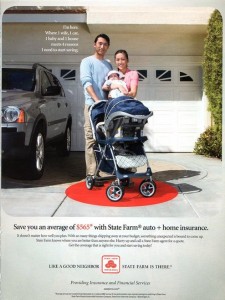 I heard a story the other day on National Public Radio that was discussing auto insurance. I currently am paying just under $100 a month for my auto insurance. I drive a 2009 Smart For Two and have full coverage. I also pay for renter’s insurance in case anything would happen to my stuff at my apartment. All in all I come in just under $100 a month. All things considered, and without adding the fact that I have a $500 deductible, my rates are not that bad. I know people that have higher, and lower rates than I do but it all even out in the end.
I heard a story the other day on National Public Radio that was discussing auto insurance. I currently am paying just under $100 a month for my auto insurance. I drive a 2009 Smart For Two and have full coverage. I also pay for renter’s insurance in case anything would happen to my stuff at my apartment. All in all I come in just under $100 a month. All things considered, and without adding the fact that I have a $500 deductible, my rates are not that bad. I know people that have higher, and lower rates than I do but it all even out in the end.
The thing that gets to me is why I pay this money and never see anything for it. I think that if I pay $100 a month (for arguments sake) at the end of the year, if I have not used any of that money that I have paid in, I should receive some sort of a bonus. I understand that I should not get all of it back as there are bills that have to be paid over at State Farm Insurance, but where is the motivation to drive safe? O course the motivation lies in not having to drop $500 for the deductible and dealing with a wrecked car, but you see where I am going here.
On NPR they were discussing a new type of insurance that is being brought into consideration for private insurance companies. This new form of insurance would track how you drive to base your premiums. Basically it would track how fast you go, your level of aggression behind the wheel, how close you drive to other vehicles on the road, and a variety of other key features of your driving. It will also take into consideration the number of miles you drive as the more miles you drive each day will increase the your chances of getting in a wreck. Also, it takes into consideration the population of the city you live in and the area you consider home based on population and crime levels.
In this new plan, multiple things are taken into effect to rate your premiums. If you drive a few extra hundred miles this month expect to pay a higher rate next month. If you move from Terre Haute, Indiana, into the metropolitan area of Indianapolis you can expect your rates to go, and to stay, up. If you have a bad day at work and are in a hurry to get home, tailgate a few folks on the way to dinner, or simply blow through some stop signs, you can expect your rates to increase next month. But is this a fair way to judge how much you should pay for your coverage?
There is a current option with some auto insurers known as Usage-based Insurance. This is also known as “pay as you go” insurance. Think of it as a pay as you go cell phone. You pay for the minutes you use and nothing more. With this form of insurance, you pay for the coverage based on time, distance, and place. These are all three things that are going to be put in place if the new form of insurance becomes a reality. This could be a great plan for someone that drives very little and has a good driving record. But it is not meant for everyone.
The plan that brought me to this blog post could be a great plan as well if you know how to use it. Not saying that you can take advantage of any private insurance plan, but this is one that, if you actually take a bit of responsibly in your driving habits, could potentially save you a lot of money. By simply driving the speed limit, not tailgating someone that cut you off, and adhering to the laws that are already in place, you could save a lot of money.
In my ever growing list of pet peeves, a lot of them occur behind the wheel. Like when you pull out in front of me and there is not a car behind me for miles. Or when you pull in front of me and immediately turn the other direction. Or how about driving ten miles an hour under the speed limit when there is only one lane and no way for me to pass you? Or maybe when you miss the entire concept of right aways. There have actually been times where I have gotten upset behind the wheel when the other driver was completely wrong. I have been chased through a parking lot, through a McDonald’s drive thru, and even into my place of employment when I worked at Circuit City. (Just so you know, when you are in the wrong, the best piece of advice I can give is to admit it rather than hiding from it. You are childish if you take the time and energy to get upset at me for getting upset at you for you being wrong in the first place.)
My biggest issue with this is how do these private insurers base these rates? Do they have research to back this? I could drive my entire life, never get a speeding ticket, never have a car wreck, and I am still paying $1,200 a year for my insurance. I think the only person that could honestly answer that question, based on how much he or she should pay, would be the driver. I could get into a fender bender, for whatever reason, and have to pay $500. Perhaps a solution for me would be to take a percentage of that out of my monthly dues if I have not used it in so many months. (I am pretty sure that there are insurance companies out there that handle rewards to their drivers with monthly, even yearly, bonuses and discounted rates.)
What are your thoughts on action based insurance rates? Should fat people have to pay more for insurance than skinny people because he or she is in greater risk of health problems? Should old people have to pay more insurance than younger folks because he or she might have higher risk of an increased doctor bill? Should people with disease pay higher rate, or even be denied insurance because they are sick? Well, if all goes according to Mr. Hope and Change, the government will be paying for our health care pretty soon anyway. But that is a story for another time as this plan is full of holes as well. Maybe I should pay more for insurance because I sit in an office all day with the lights turned down. Are my eyes in greater risk than yours?



